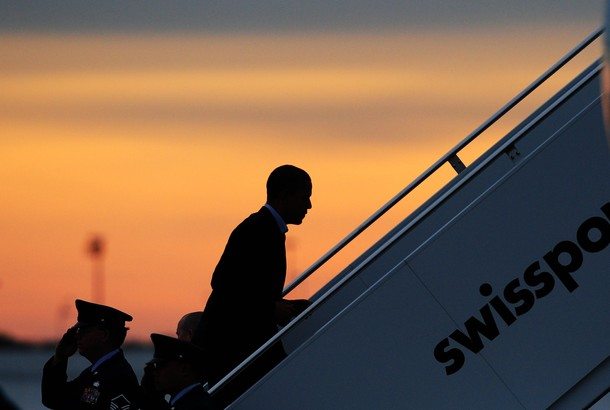US President Barack Obama asked key senators Tuesday for a delay in imposing new sanctions on Iran, but faced skepticism over the terms of a proposed interim nuclear deal with the Islamic Republic.
Obama met the lawmakers at the White House on the eve of the next round of nuclear talks between the P5+1 powers and Iran in Geneva, and as some senators mull adding to sanctions which have already crippled Iran’s economy.
Obama told the top Democrats and Republicans from the Senate Armed Services, Intelligence, Foreign Relations and Banking committees that “new sanctions should not be enacted during the current negotiations,” said White House spokesman Jay Carney.
But he said such measures “would be most effective as a robust response, should Iran not accept the P5+1 proposal, or should Iran fail to follow through on its commitments.”
The president himself said he was unsure if a interim deal was imminent in Geneva, and defended the idea of offering Iran some modest relief from sanctions in return for curbs on its nuclear program while a comprehensive agreement is worked out.
“I don’t know if we will be able to close a deal this week or next week,” Obama said at a Wall Street Journal CEO forum.
Earlier, Senator Bob Corker, the top Republican on the Senate Foreign Relations committee, emerged from two hours of White House talks and said there were still concerns over Obama’s tactics.
“We had some folks in the room that were satisfied, I think we had some folks in the room that were very unsatisfied,” Corker told reporters.
Corker also signaled that Obama will get some breathing room — because Senate procedures meant there would be no votes on toughening sanctions on Iran in the Senate until after the US Thanksgiving holiday at the end of next week.
Another group of senators wrote to Secretary of State John Kerry, who was also in the White House meeting, warning that Iran was not being asked to do enough to justify easing economic pressure.
“We are concerned that the interim agreement would require us to make significant concessions before we see Iran demonstrably commit to moving away from developing a nuclear weapons capability,” wrote Democratic Senators Robert Menendez, Chuck Schumer and Bob Casey and Republicans John McCain, Lindsey Graham and Susan Collins.
The senators complained that world powers were reportedly prepared to allow Iran to continue enriching uranium to 3.5 percent, to cap but not cut its battery of centrifuges and to continue work near the Arak plant that is designed to eventually produce plutonium.
The senators warned such steps would see Iran slow its pursuit of a nuclear weapon but still make progress towards that goal and said sanctions should only be eased for wider Iranian concessions.
Obama, pushing back at criticism from the lawmakers and from the Israeli government said the kind of relief being offered Iran would only allow it to access a small portion of $100 billion in assets it has frozen overseas.
“We are not doing anything around the most powerful sanctions. The oil sanctions, the banking sanctions, the financial services sanctions, those are the ones that have really taken a big chunk out of the Iranian economy.”
“All of those sanctions and the architecture for them don’t go anywhere.”
The White House has not publicised the terms of the proposed deal with Iran but insists that it will “freeze” and “roll back” aspects of Iran’s nuclear program for the first time in years.
“The alternative … is to potentially pursue a comprehensive agreement without any restrictions on Iranian behavior,” said Carney.
The powers taking part in the talks in Geneva include Britain, China, France, Russia and the United States, as well as Germany.
The White House believes a “modest” and reversible set of measures to ease Iran’s economic pain is needed as a show of faith that Washington is serious about a final deal and also to shield Iranian negotiators from pressure from hardliners in Iran.
It also rejects reports, notably from Israel that the deal would allow Iran $40 to $50 billion in sanctions relief.
The top Republican on the Armed Services Committee, Jim Inhofe, warned Obama that “a country that has deceived us and concealed their nuclear program for over 20 years.”
Democratic Senator Dianne Feinstein said that new sanctions could blow the talks apart, and leave Obama little option but to use military force to halt Iran’s nuclear program.
“Now if you want a war, that’s the thing to do. I don’t want a war.”










